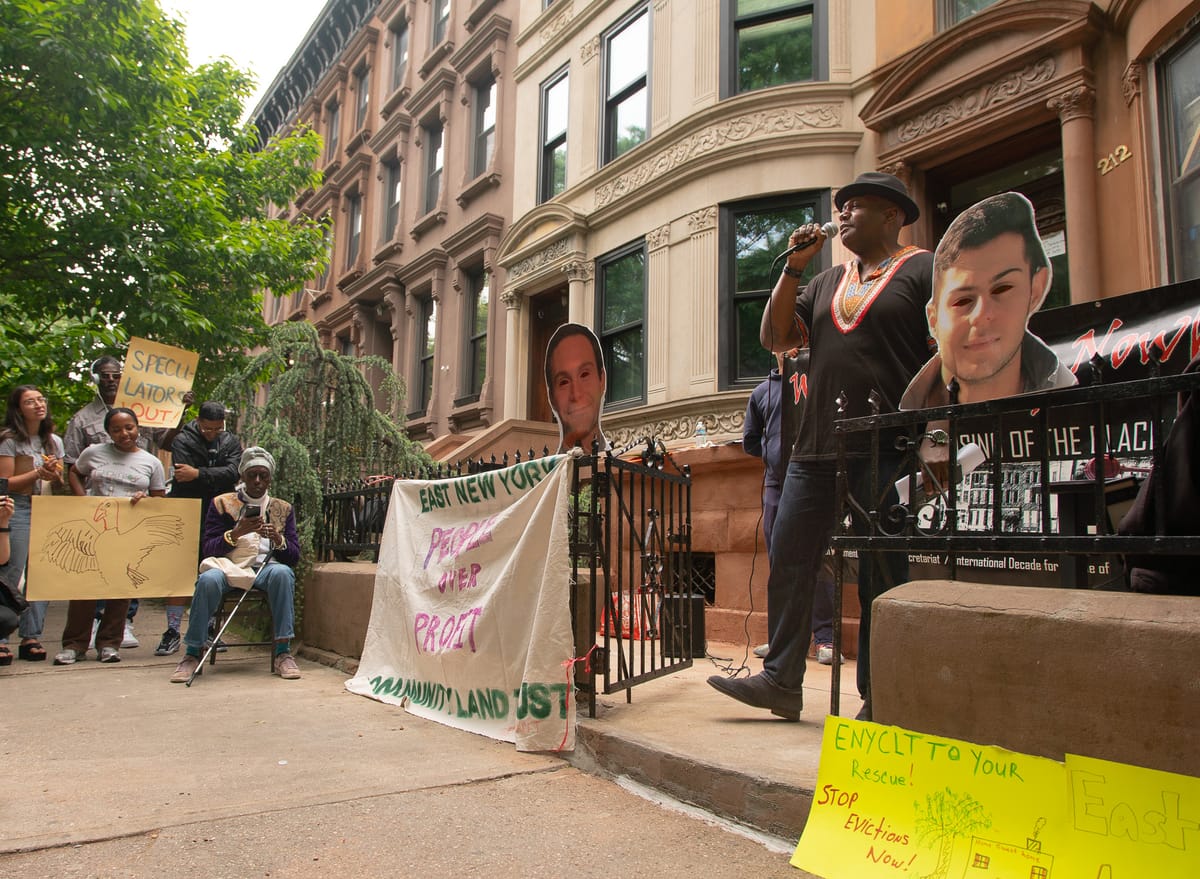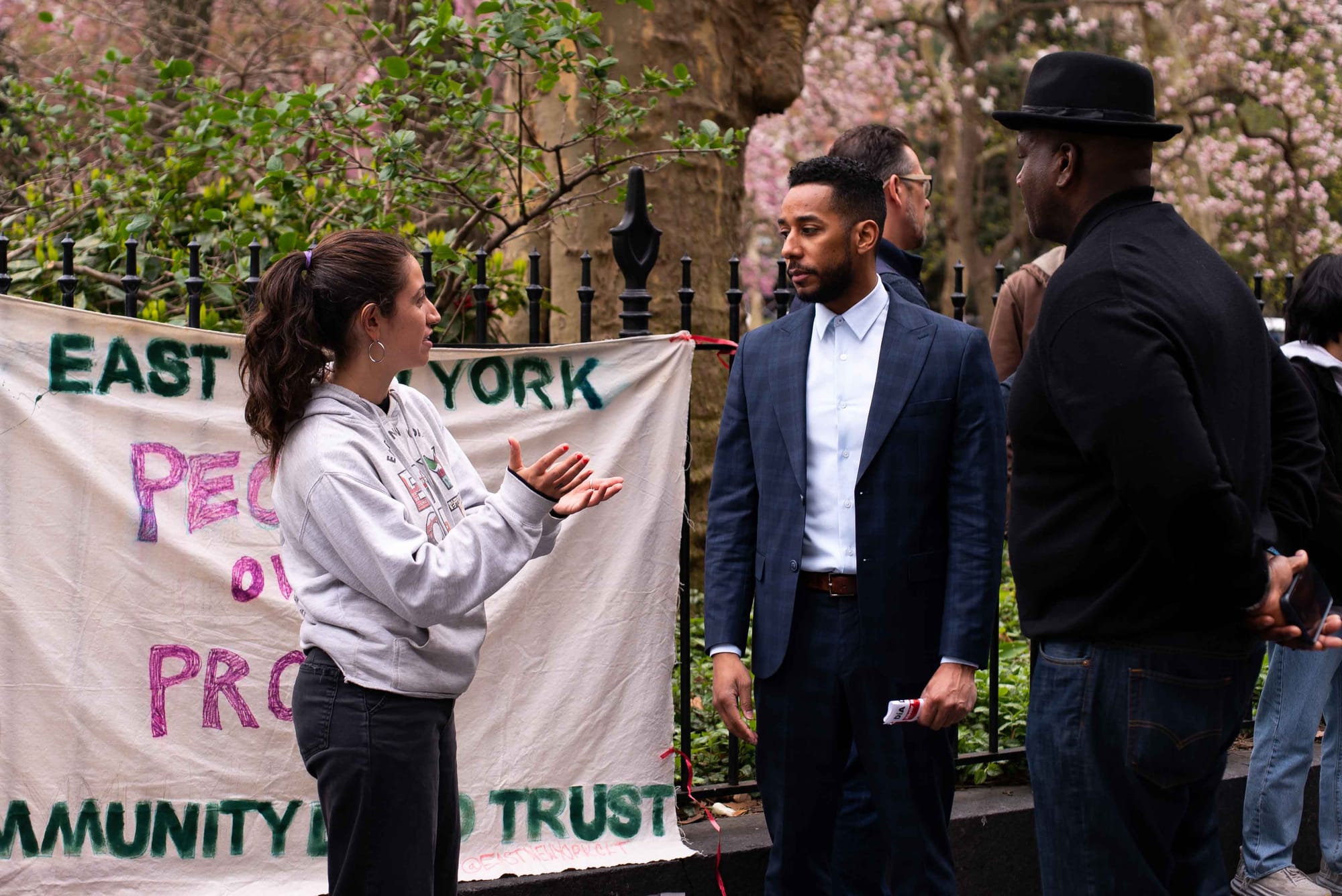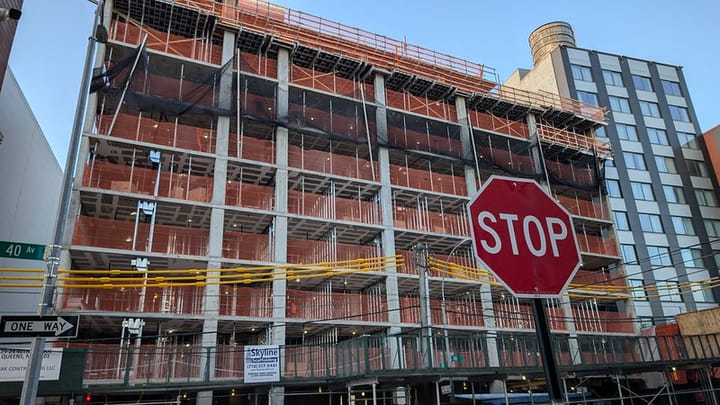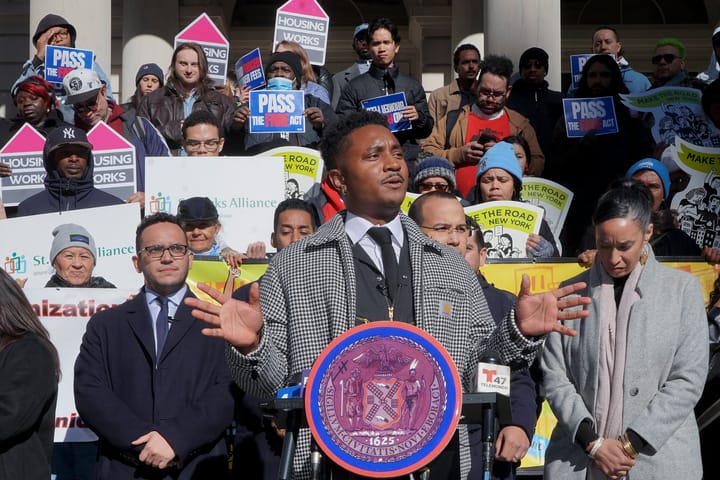Tax lien sales are back; here's how to protect yourself
Activists are none too thrilled about the return of this Giuliani-era policy

Property ownership may seem like a fever dream for many New Yorkers. But if you or your family earned your part of that dream, don’t let hard times take away your own stake in the city. And if you’re a renter, don’t let the city make it even harder to get recourse against your deadbeat landlord. All of which is to say: Believe it or not, you really should care about a newly-reinstated policy known as the “tax lien sale.”
Let us explain: The Department of Finance has announced that come May 20, almost 30,000 property owners may face a tax lien sale. This means the city will bundle overdue property taxes, water bills and some unpaid fines and sell off the debt to private investors. The city council hasn’t reauthorized this type of sale since 2021, when activists organized to stop the practice entirely. They say the sale lets absentee landlords milk aging buildings, then walk away without repairing them, and also creates another obstacle for New Yorkers of color looking to build generational wealth with their homes.
"Low-income renters and homeowners, seniors and communities of color have suffered as a result [of tax lien sales], but we're fighting back,” housing activist Albert Scott, Jr. told a group preparing to canvass their neighborhoods about the lien sale in the coming weeks. “Our organizing led to the city council to enact major reforms to the lien sale, but we have not abolished this predatory policy yet.”
Even with unprecedented ways for homeowners to get off the list and tenants to report deadbeat landlords for failing to do repairs, advocates want the sale gone.
"We should definitely be talking about abolishing it all together,” Brooklyn Borough President Antonio Reynoso told me at a demonstration against the tax lien sale back in April 2024. He said the movement to end the sale has become more popular, focusing on the impact to communities: “It’s something that I think is regressive, doesn't speak to the city that we want to be. And also, again [...] profits off of the pain of homeowners that can’t pay their taxes or their water bills.”
How it works
The lien sale combines all the money that property-holders owe the city and then sells that debt. If owners don’t start making payments, foreclosure could come next.
Most property owners need to owe $5,000 in back taxes or $1,000 to $3,000 in water bills to have their debt sold; over 40% of properties on this year’s initial list only owe the city water bill payments. You can check your property tax backlog here and pay your water bill here.
Even if you don’t own real estate yourself, you might feel the effects of this issue: when the city gives up its financial stake in a building, opponents of the sale say, it loses a major mechanism to make dirtbag landlords fix things. Once the debt is sold to private investors, the city can’t threaten to foreclose over building violations, which costs agencies ways they could enforce the rules, including taking over the buildings themselves. And, advocates say, new speculative landlords might buy the properties after foreclosure and repeat the short-term game of real estate hot potato — more on that later.
As for the eventual sales, does this mean that you can scoop up a cheap property like a pawn shop engagement ring? Not necessarily. All the debt is glommed together by the city and sold to an investor for about 75 cents to the dollar. The new lienholder can foreclose if the property owners don’t start making payments (or enter a payment plan) within a year. New taxes must be paid within six months and interest within one month to avoid foreclosure. Oh, and the interest compounds daily, so the odds stack up against debtors.
Advocates (and even a pre-mayoral office Eric Adams) oppose the tax lien sale because it pushes vulnerable homeowners toward losing their property. Last year, the Adams administration compromised with the City Council on the reformed version of the practice. The sale means foreclosures loom and speculators eye properties they can scoop because of desperate owners.
Neighborhoods of color, those with high poverty rates and those staring down the barrel of gentrification have the bulk of the properties listed for the tax lien sale. The zip code with the most buildings on the list is 11207, which stretches from west Bushwick to East New York.
“The lien could be used as a way for a city to be holding the landlord accountable, and to be pressuring the landlord to actually do right by tenants."

The impacts on renters
An East New York housing group, the ENY Community Land Trust, door-knocked in east Brooklyn and western Queens during the last lien sale in 2021 and learned that 85% of those residential lien sales were controlled by absentee landlords. Their analysis found these units were concentrated in Black and Hispanic/Latino neighborhoods and tenants were living with six to seven times more building violations than similar buildings.
Elise Goldin of the New Economy Project, a nonprofit that encourages anti-corporate community initiatives like worker cooperatives and credit unions and opposes the lien sale, explained that if a property enters the tax lien sale, the city loses its ability to pressure landlords to fix buildings.
“The lien could be used as a way for a city to be holding the landlord accountable, and to be pressuring the landlord to actually do right by tenants,” she said. Without the sale, the city could foreclose on properties itself and deal with them responsibly. “They give that power up, so they're not involved with the building in the same sort of financial way.”
One of the major new reforms to the tax lien sale includes outreach to tenants. Housing Preservation and Development (HPD) will contact renters in buildings that reappear on the 90-day tax lien sale list, which could mean that the owners are taking rent money and shirking their responsibilities. “That’s basically unprecedented,” Paula Segal, the activists’ lawyer, said as they met online this week to discuss door-knocking in their communities. “HPD will come to your building if you call 311 and report your landlord … To have HPD doing affirmative inspections of buildings, where the indicators are that the landlords might not be taking care of business, that’s a big one.”
In the meantime, advocates recommend that tenants continue calling 311 to keep a record of who is falling behind on repairs, and that they call their representatives as well. In their organizational meeting, Albert Scott told attendees that he saw people living without heat or hot water, or with faulty electricity, when he canvassed.
The impacts on homeowners
That reform helps tenants of predatory and delinquent landlords, but what about the regular homeowners who risk losing their property?
Speculators pay attention to this list. Of course they do, it’s a one-stop shop to find property holders who are behind on their bills and feeling pressure from the city. Or, as one lawyer for developers calls it, “intense financial strain.”
A spokesperson for the Department of Finance, which oversees the lien sale, told The Groove the city has to notify affected people that their property is on the list. They put the properties on their website and send out mailers. But, they recognize publicizing that information could let speculators know about an opportunity. “We understand the concerns around bad actors trying to take advantage of owners experiencing hardship,” they said. “Which is why… we want to reach as many at-risk owners as possible so that these owners know their options.”
When the lien sale was temporarily paused in 2020, almost a dozen housing organizations created the Abolish the NYC Tax Lien Sale Coalition to keep neighbors in their homes. The group says that speculators approach people from this list and pressure them into unfair sales as the owners feel pressure from the city. They want these properties to stay in the community for nonprofit development. They credit their advocacy with the sale’s original expiration post-2021, as well as the reforms offered in this year’s sale. Many off-ramps for property owners and mechanisms for oversight of landlords are in place for the first time. The activists say the wins came in a hodgepodge from new legislation, a commitment letter from the mayor and the city council’s budget negotiations.
But, they want to do away with the sale entirely.
Last April, the coalition held a protest at City Hall to try to prevent the return of the tax lien sale. A life-size Rudy Giuliani zombie cutout made an appearance. That’s because the lien sale began under the real-life Giuliani in 1996 and was renewed every four years until that pause in 2020, briefly revived in 2021, and is now back again through 2028.
“Like former Mayor Giuliani, it was ghoulish,” the Councilmember Nurse co-wrote in a Next City op-ed about pre-reform sales in October. “The old Giuliani lien sale was merciless and had disparate impacts on small homeowners in low-income Black and brown communities.”
Eric Adams, as a candidate, agreed with the protestors. He campaigned on ending the tax lien sale, but never put forward a clear alternative. His administration’s task force came up with ideas in 2021, but didn’t reach a consensus.
Now that Adams is our beleaguered mayor, the lien sale rides again. His Office of Management and Budget estimates the sale will bring in $80 million annually over the next five years. City documents obtained by Bloomberg last year estimate the city’s delinquent property taxes at over $880 million, a significant increase since the start of the pandemic.
"Property taxes are the city’s largest single source of revenue and it is crucial that we enforce [them] to fund critical city services,” the Department of Finance spokesperson told us. “The goal of this program is to ensure we’re offering protections and options for those that cannot pay, and enforcing against those who can pay.”
What to do if you’re on the lien list
If you’re on the list: don’t despair, you still have options to save your home if you do some paperwork. The CITY reported that roughly 11,000 properties were on the 90-day warning list last time and fewer than 3,000 made it to the sale. Community activists and politicians like Councilmember Nurse have won a lot of what they call “off-ramps.” The new rules for the sale include a lot more communication (and public lists of properties), estate planning help and exceptions to be excluded from the sale.
First: don’t ignore the letters if they come. The city committed to spending $2 million on outreach. The City Council also budgeted $1 million to give New Yorkers free estate planning counsel, like these sessions for people over 50 years old who make less than $100,000.
While you’re taking care of business, get your will sorted. A lot of New Yorkers lose generational homes due to fuzzy ownership when someone passes on, including 3,500 claims of deed theft that reached the sheriff in the last decade.
Once you have that taken care of, the tax lien sale is rife with those aforementioned “off-ramps” to make sure you don’t end up on the 30-day notice list.
- If you’re living in the property you own, it has three units or fewer, it’s all you own in the city, and you make less than $107,300, you can apply for an option known as an “Easy Exit,” which removes you from the lien sale list for one year so you can sort out your payments.
- Lien exemptions are available for senior and disabled New Yorkers, veterans and active-duty military personnel and nonprofits.
- The city offers payment plans, including a “Circuit Breaker” if you spend more than 10% of your income on property taxes, among other requirements. That caps your payments. There are also payment plans for people facing extenuating circumstances (like the loss of employment or loved ones).
One less-than-helpful holdover from the pre-reform days is a program that takes control of indebted properties that the city considers “distressed” (called "Third Party Transfer”).
As Brooklyn borough president, Eric Adams slammed that program. In 2019, Bklyner reported him calling it “racist” and “a clear conspiracy to remove homes from Black and Brown people.”
Councilmember Pierina Sanchez, in her ongoing attempts to reform it, stated in a January press release that a 2019 council audit found over half the foreclosed properties were not in distress and most were in a few low-income neighborhoods of color.
The 2025 lien sale process will supposedly offer a voluntary foreclosure option, which means an approved nonprofit (a “Qualified Preservation Purchaser”) can receive the property, maintain it, and offer an affordable, long-term lease to the previous owner. But, the city’s website says that can only happen after the tax lien sale — and they will make the application available after May 20. Housing and Preservation Development has a community-oriented list of nonprofits called Qualified Preservation Buyers.
So, if you’re lucky enough to have a stake claimed in this city – don’t let them take your shit! You absolutely, 100%, definitely need to square this away by May 19. But if you ever tried to get unemployment during the pandemic or call 311, you know things take a while. You can apply for exemptions and payment plans today.




Comments ()